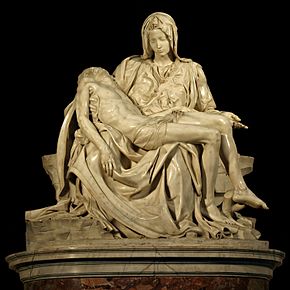Why are we Here?
 |
| Michelangelo's Pieta |
I was born on December 14, 1941; 25
days later, on January 8, 1942, a
baby was born to the Hawking family in Oxford England. His
parents named him Stephen. In 1962, I launched my career as a green,
20 year old teacher in a rural school in Saskatchewan; before my
first year was up, Stephen Hawking—then in PhD studies at
Oxford—would begin to fall down for no apparent reason. He was
diagnosed with Amyotrophic Lateral Sclerosis. ALS. The dreaded Lou
Gehrig's Disease that robs muscles of potency and renders its victims
totally helpless.
There is no known prevention or cure for ALS.
Even as his physical condition
worsened, Hawking continued his studies, probably taking refuge in
the burgeoning of his mind as his body continued the inevitable decay
called ALS. His amazing thesis on black holes launched him as a
scientific leader who, despite the odds, would advance the study of
cosmology forward by leaps.
It’s astounding to think that
theoretical physics can be done through imagination, even when one
hasn’t the strength any longer to pick up a pair of calipers. Speech must
be delivered digitally, electronically and some of us have become
used to the mechanical, computer-generated voice of Hawking holding
forth on subjects we only partially understand.
PBS recently broadcast episodes from
the Genius series; the one I watched the other day was a brilliantly
done educational presentation called “Why
are we Here?” In it, Hawking explores the tension between determinism and
free will, the idea of parallel universes and, in fact, is
positing the question, “how did we get here?” as opposed to
the burning Christian question, “for what purpose were we created?”
The title of the episode is a bit of a misnomer, seems to me.
I’ll be going to church this Sunday
morning. There a purposeful creation will again be assumed in what is
said and done. The question any Christian must have after watching
Why are we Here? is the same
as thinking believers must have had ever since the church harassed
Galileo into making a false recantation: why can’t the discoveries
of today be added to the wisdom handed down from yesterday? Galileo
and Copernicus asserted from their observations that the sun—not
the earth—was the centre of the known universe. They were right.
What they said was true. How much better would it have been for both
believers and for science if the church hadn’t set theology and
science at odds?
But
it’s not news, I guess, that prophets seemingly have to be stoned
to protect us from the truth. The right question for us might
be—rather than why are we here—“Why
are we so unadaptable to new knowledge?” That was certainly Jesus’
question when he looked down on Jerusalem and wondered how the
population could choose not to gather under the loving wings of God
to be protected like a hen protects her chicks.
However
we understand God, it seems axiomatic to me that he/she is a friend
to truth, not a bulwark against it. It may be true that it was particularly for human perfidy that the word stubborn
was coined.
It’s
an insignificant accident, of course, that Bernie Sanders, Stephen Hawking and I
are roughly the same age, give or take a few days. The significant
observation on that front, though, is that their voices may well prove to have been prophetic. Granted, you and we and everyone who ever was are mere humans, with all the foibles that go along with that. That alone may be reason enough to assert that we are the only species that is plagued by the "Why are we Here?" question.



Comments
Post a Comment